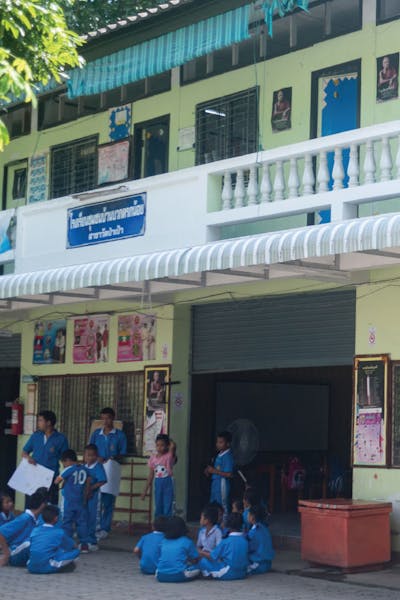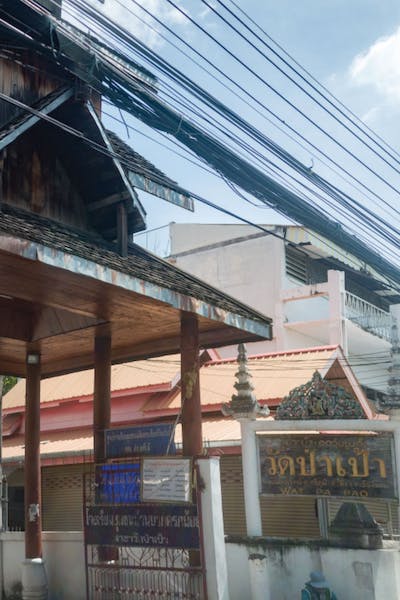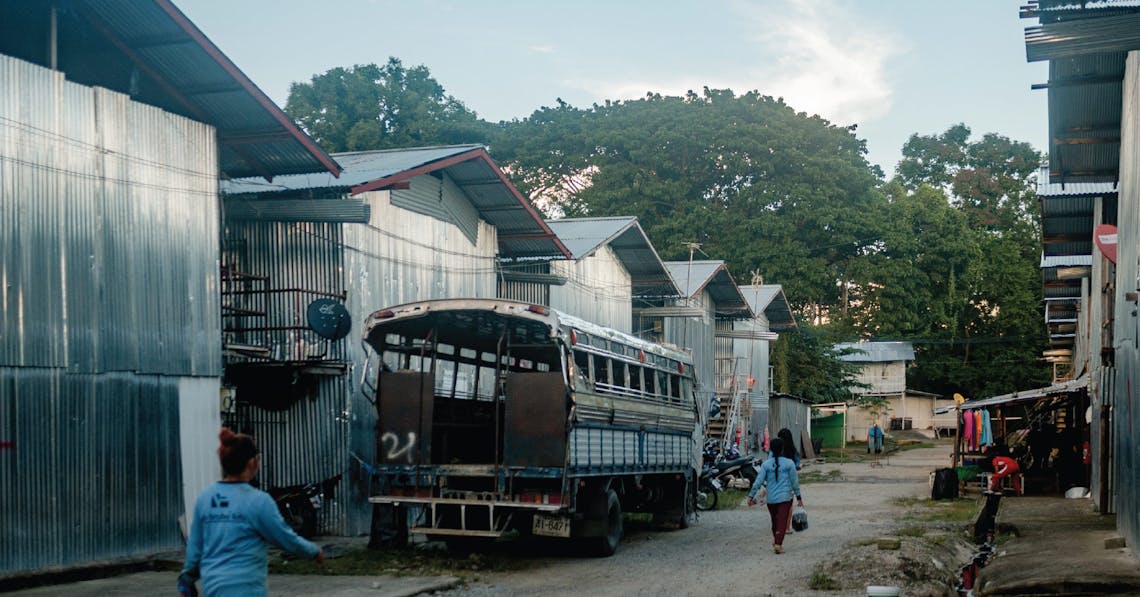For the past few hundred years the people of Chiang Mai have had a strong relationship with their cultural and ethnic brothers and sisters across the border in the Shan State. Our royal families intermarried, we took turns exerting power and influence over one another, trade was brisk, Buddhism and cultures shared, languages were similar enough to converse with one another and we even look similar. Combine those elements with the geo-proximity, and the Shan had more affinity for their southeastern neighbours in Chiang Mai than they did their southwestern Burmese oft-times enemies. So in the early nineties when the Burmese army attacked, Thailand became the natural place to escape to. Starting in 1992, an influx of Shans began to enter the Thai labour market, and the government has been struggling — and failing — to figure out how to manage them ever since.
Today about 90% of the more than 100,000 migrant workers believed to be living in Chiang Mai Province are Shan. Most work as labourers as well as agricultural, factory, domestic and sex workers. For the majority, especially new arrivals, life is very hard and rife with oppression; a different and less violent form than that from which they fled, but oppression nonetheless.
“It would be dangerous to accuse the government of having a deliberate policy [of oppression],” said Brahm Press, Director of Migrant Assistance Program Foundation (MAP) who has spent the past 20 years working for the rights of migrant workers. “But the government has always been concerned about national security and undocumented migrants, this has been evident in their policies.”
In June of this year the junta announced the Decree on the Management of Foreign Workers Act 2017 prescribing that employers be fined 400,000-800,000 baht for every foreign employee working illegally as well as facing possible jail time. Migrant workers were given two weeks to comply or face hefty fines and imprisonment. This led to the exodus of over 60,000 migrant workers and the immediate pushback from Thai industries, notably the fishing industry, which lost their workforce in a matter of days. While many migrant workers returned home, some, cynical from experience, simply waited across the border for the government to change its mind. Which it did, a mere week later, in response to pressure from their true constituents — big businesses. Migrant workers were given six extra months to conform to the new decree. They returned, industries continued to operate and the government again failed to make headway in what has become a continuous cycle of reform, reaction and restriction.
Today about 90% of the more than 100,000 migrant workers believed to be living in Chiang Mai Province are Shan.
The reason for this latest policy embarrassment was the impending release of the Trafficking in Person (TIP) report, by the U.S. Department of State, ranking Thailand a tier 2 watch list nation for human trafficking. “The government therefore artificially equated undocumented workers as trafficked workers hoping for a better ranking next year,” said Press. “But you can argue that many migrants went through formal recruitment channels,” explaining further that it was often the incomprehensibly complex and ever-in flux laws which prevented so many from remaining legal. Interestingly, Malaysia also had a crackdown on their migrant workforce at the same time following their similar ranking by TIP.

Thailand has a 1.08% unemployment rate, in spite of the two million legal and approximately one million undocumented migrant workers doing menial jobs many Thais no longer wish to do. Yet migrant workers who are estimated to contribute between 0.75% and 1.25% to the GDP, are constantly exploited and scapegoated, marginalised and maligned, their status vulnerable and futures unsecured.
“Someone wanting to escape conflict, or forced recruitment into the army will most likely pay an agent in Shan State between 3,000-5,000 baht,” explained Yonlada Tanakronsakul, of the Migrants Justice Programme, Human Rights and Development Foundation. “They will likely be brought to the border or outskirts of Chiang Mai where they will either work on farms or have to pay a Thai agent in the tens of thousands of baht to secure employment and legal documents. The problem is that many are undocumented, their homes and villages having burnt down, or their distrust of Burmese authorities meaning that they have no official papers. In the past the Thai government has at times demanded that these workers return home to get proper documentation, other times they have set up stations to interview workers so that they can liaise with Burmese authorities in the Shan State to investigate claims, but these processes are neither practical nor speedy. It is easier to pay an agent who then pays officials under the table to get everything in order. When you are earning under 150-200 baht per day, this is just not enough to live on.”
“Many workers are also stuck in rural farms or in private residents and simply don’t have access to information about their rights,” continued Yonlada. “It is only those who can negotiate days off or live in labour settlements who have access to information. Many Shans will go to their temples such as Wat Pa Pao or Wat Ku Tao, on their days off, but since most only get one day off per month, if that, many fall through the cracks.”
Yonlada’s foundation works to help migrant workers fight for their rights. “We have had cases of workers being owed hundreds of thousands of baht by employers who simply feed them and give them shelter, never paying them. We can help them redress this. Many workers also don’t know that Thailand has a free education for all policy and that their children are entitled to an education regardless of nationality. If employed, they also should have access to health care, though sometimes we hear cases of hospitals refusing care to undocumented workers, especially when it comes to diseases such as HIV or TB. Then there are the labour laws, restriction on underaged workers, working hours, etc. If we hear about these cases, we have the resources to fight for them.”
“Many workers are also stuck in rural farms or in private residents and simply don’t have access to information about their rights.”
“The problem is that there are no lines of accountability,” agreed Press. “These agencies have sub agencies from both sides of the borders operating illegally. Most of the migrant workers only get their information from these brokers to whom they pay to process their papers and who are never held accountable. One of the biggest disconnects is between the rigid government policies and labour market which is becoming more fluid and flexible. So if you are a labourer, by law you have to have one employer and one place of employment. The reality is that many are moved by brokers from one construction site to the next, working for multiple employers. It simply isn’t possible for them to reapply for a new work permit each time. Sometimes a domestic worker works in a shop house but if they help out in the shop, rather than the house, they are immediately illegal. It is this military nationalistic singular thought that you can put people into boxes and control them and that shows that you have power and it is your country, that is hard to undo. On top of that the government is reactionary and there is no long term plan for accommodating migrant workers.”
It is this artificial containment which leads to the vulnerability to exploitation of so many. “When you are freely able to search for employment, your employers will treat you better,” added Press.

Though successive governments have failed to solve these problems, the military has been a constant and major influence on migrant policy decision making for decades, often citing national security for their harsh restrictions and penalties. In spite of this, the blame needs to be shared amongst we Thais ourselves. Time after time the media, and at times the police, use migrant workers as scapegoats and there is a national attitude towards migrant worker which needs to change. On online forums such as Pantip or in various Facebook groups, it is not uncommon to see conversations bemoaning the vermin that are migrant workers who are thought to bring disease, be gold diggers, dirty, uneducated or lack the appreciation of and respect for the largess of Thailand in allowing them to live and work here.
“In twenty years I have noticed that government agencies are more sensitive than in the past,” said Press, “and our young Thai interns are more sensitive to these perspectives, but as a society I have hardly seen changes in Thai attitude.” Thailand needs to set long-term policies to recognise the place and need for migrant workers, not just in the economy but society at large. The government also needs to begin consulting stakeholders — employers, civil society, both Thai and migrant work forces as well as NGOs — when forming policies.
“By law migrant workers are only allowed to work as labourers or in domestic capacities,” continued Yonlada. “Basically as long as they don’t use their brains. This doesn’t allow many to develop and grow and contribute in other ways to society.”
Asst. Prof. Pinkaew Laungaramsri from the Department of Sociology and Anthropology, Chiang Mai University told Way Magazine in an interview this past July, “Since 1992 when the government realised that they had to create a policy for migrant workers, they have never had success. It is because the attitude is to control, to limit rights, to take advantage. The migrant workers are forced to stay in one place, to serve. Even when they register they have to be accompanied by an employer, similar to the old feudal system. In spite of the fact that the government needs these people, they have gone as far as sending pregnant women back home in fear that they will breed here. They do not see migrant workers as humans, but only there to be squeezed. This has led to constant failed policies and a lack of cooperation from the workforce itself due to excessive and repeated fees, inconsistent policies and very limited rights.”
Unlike the distrust created through centuries of conflict with the Burmese, the Shans have assimilated extremely well into Thailand, especially here in Chiang Mai.
Many of the early arrivals have managed to find pathways to citizenships during rare moments of compassion from the government and some have established themselves as successful in their fields, often reaching out into the Shan community to help and support the less fortunate. But though there are significant pockets of Shan communities in Chiang Mai, many who are undocumented or have had bad experiences with Thai authorities tend to keep a low profile.
Unlike the distrust created through centuries of conflict with the Burmese, the Shans have assimilated extremely well into Thailand, especially here in Chiang Mai. “The Shan are religious people, just like us,” said Phrakru Amarawirakhun, Abbot of Wat Pa Pao, one of the main community centres for Shan life here in Chiang Mai. “So they come to the temple a lot and this is how they retain their identity, language, culture and sense of history. This is very important because many are only here for a short while and fully intend to go home one day. On the other hand the Shan are also very Thai, causing minimal disruption and adopting and adapting to the Thai culture, with many settling here permanently.”
MAP (Migrant Assistance Program) Foundation has been running a Shan language radio station for over a decade, offering information to the thousands of Shans living not just in Thailand but also across the border as to their rights as well as up to date policy information. They also offer redress mechanisms, and assist with information on issues ranging from reproductive health to child and women’s rights.
“We believe that people should have the right to freedom of movement and they shouldn’t be constrained to a single area. The more you restrict movements and rights, the more negative the outcome,” concluded Press. “We also want to change the narrative. Instead of calling them aliens or illegal, they are simply undocumented. We believe all people are legal, to say someone is not legal implies that they are not entitled to their rights.”
Related Article: The Importance of Being Thai: giving citizenship where citizenship is due
